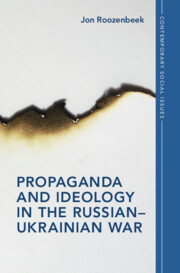Book contents
- Propaganda and Ideology in the Russian–Ukrainian War
- Contemporary Social Issues Series
- Propaganda and Ideology in the Russian–Ukrainian War
- Copyright page
- Contents
- Figures
- Maps
- Tables
- Acknowledgements
- Note on Transliteration
- Abbreviations
- Maps
- Introduction
- 1 A History of Russian–Ukrainian Relations
- 2 The Politics of the Donbas ‘Republics’
- 3 Building a Propaganda Machine
- 4 Newspaper Narratives in Occupied Ukraine
- 5 Identity and Ideology in Online Media
- 6 The Consequences of Propaganda
- Concluding Remarks
- Appendices
- References
- Index
1 - A History of Russian–Ukrainian Relations
Published online by Cambridge University Press: 16 May 2024
- Propaganda and Ideology in the Russian–Ukrainian War
- Contemporary Social Issues Series
- Propaganda and Ideology in the Russian–Ukrainian War
- Copyright page
- Contents
- Figures
- Maps
- Tables
- Acknowledgements
- Note on Transliteration
- Abbreviations
- Maps
- Introduction
- 1 A History of Russian–Ukrainian Relations
- 2 The Politics of the Donbas ‘Republics’
- 3 Building a Propaganda Machine
- 4 Newspaper Narratives in Occupied Ukraine
- 5 Identity and Ideology in Online Media
- 6 The Consequences of Propaganda
- Concluding Remarks
- Appendices
- References
- Index
Summary
This chapter covers Russian–Ukrainian relations during pre-Soviet times (ninth century CE until about 1921), the Soviet era (1921–1991), and the period between the fall of the Soviet Union and Ukrainian independence in 1991 and the Euromaidan revolution of 2014. The lands that form present-day Ukraine have been inhabited by independent-minded peoples for centuries. Ukrainian identity began to take on a national character in the 1800s, when writers and activists set up a sprawling network of political movements pursuing an independent Ukraine. The Soviet era was marked by periods of intense suffering: the famines of the 1930s and the slaughters of World War II, during which millions of Ukrainians died as a result of both war and policy. After the Soviet Union came undone in 1991, relations between Russia and independent Ukraine gradually soured after the 2004 Orange Revolution and especially the 2014 Euromaidan Revolution. Over the course of this period, a shift away from ethno-nationalism and towards a civic national identity took place in the country, with especially Russian-speaking Ukrainians ‘shedding’ parts of their ‘Russian-ness’.
Keywords
- Type
- Chapter
- Information
- Propaganda and Ideology in the Russian–Ukrainian War , pp. 7 - 26Publisher: Cambridge University PressPrint publication year: 2024

